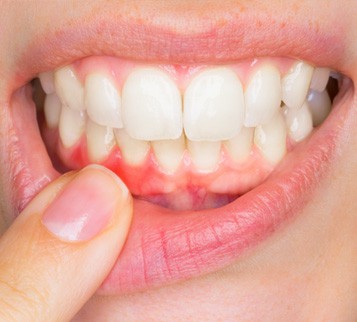Bleeding Gums, Loose Teeth & Bad Breath: The Warning Signs you Mustn't Ignore
A Healthy Gum Is Your Tooth’s Best Friend
Do you have painful and bleeding gums?
Are you avoiding meeting people because of bad breath?
All the above issues are due to a condition called gingivitis, which is more commonly called gum disease. Worry no more! You are in our expert hands. We have been resolving gum diseases for the past 17 years and we will resolve yours too!
Gum disease is also called gingivitis or periodontitis. Gingivitis is a gum disease that affects the soft tissue surrounding your teeth.
Periodontitis is a severe gum infection that affects the soft tissues of the teeth. If it is left untreated, it can even break the bones that support your teeth.
Periodontitis can cause teeth to get loose or cause tooth loss. Some of the symptoms of gum disease are bleeding gums, bad
breath, loose teeth, swollen and painful gums, painful chewing, and gums are that moving away from your teeth.

4 Stages of gum diseases
There are four general phases of gum disease. Gingivitis may lead to a more severe condition of periodontitis if left untreated.
- Stage 1: Gingivitis is the first step of gum disease, and its symptoms include swollen or bleeding gums when brushed.
- Stage 2: A minor loss of bone supporting the teeth occurs in early periodontitis, although other signs may not be readily detected.
- Stage 3: More bone and gum tissues are lost in mild periodontitis, and teeth may also be loosened.
- Stage 4: Advanced periodontitis is the most severe stage of the disease. Symptoms become more serious. Teeth may become very loose, and chewing and biting may hurt. In general, intensive dental care is needed to try to repair the harm caused by advanced periodontitis.
What are the symptoms of gum diseases?
The most common signs and symptoms of gum diseases are:
- Red, swollen or bleeding gums or some other pain in mouth
- Bleeding gums while brushing, flossing, or eating hard foods
- Gums that recede or draw away from the teeth
- Loose teeth
- Bad or foul breath
- Accumulation of Pus between your gums and your teeth
- Changing the way your teeth fit together when you bite
- Change of fit of your dentures
Benefits of treating your gum diseases
Treating your gum disease would provide you with the following benefits:
Keep your teeth happy by keeping your gums healthy!

Learn more about Gum Diseases
We at Advanced Dental Implant and TMJ Center thrive on providing world-class care to our patients. We make sure that all our patients are comfortable and satisfied with their treatment. Dr. Adatrow is passionate about providing personalized care. He spends time with the patients, understands his patient’s condition, and recommends the best possible treatment to his patients. He has intensively trained in the University of Tennessee and Indiana University hospital for treating bleeding gums and administering sedation to his patients. He is the only practicing board-certified periodontist and prosthodontist in the southern United States. He has experience of more than 17 years.




46.2% of American Adults have a form of Gum disease!
Dr. Pradeep AdatrowThat's about 64 Million People.